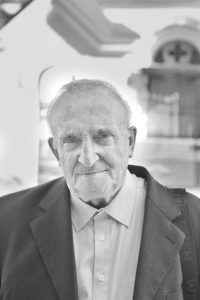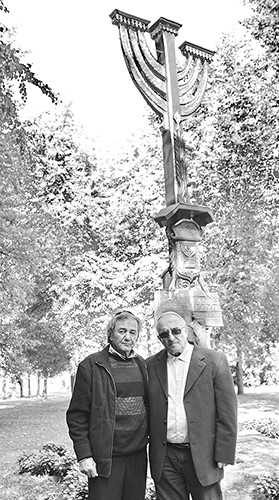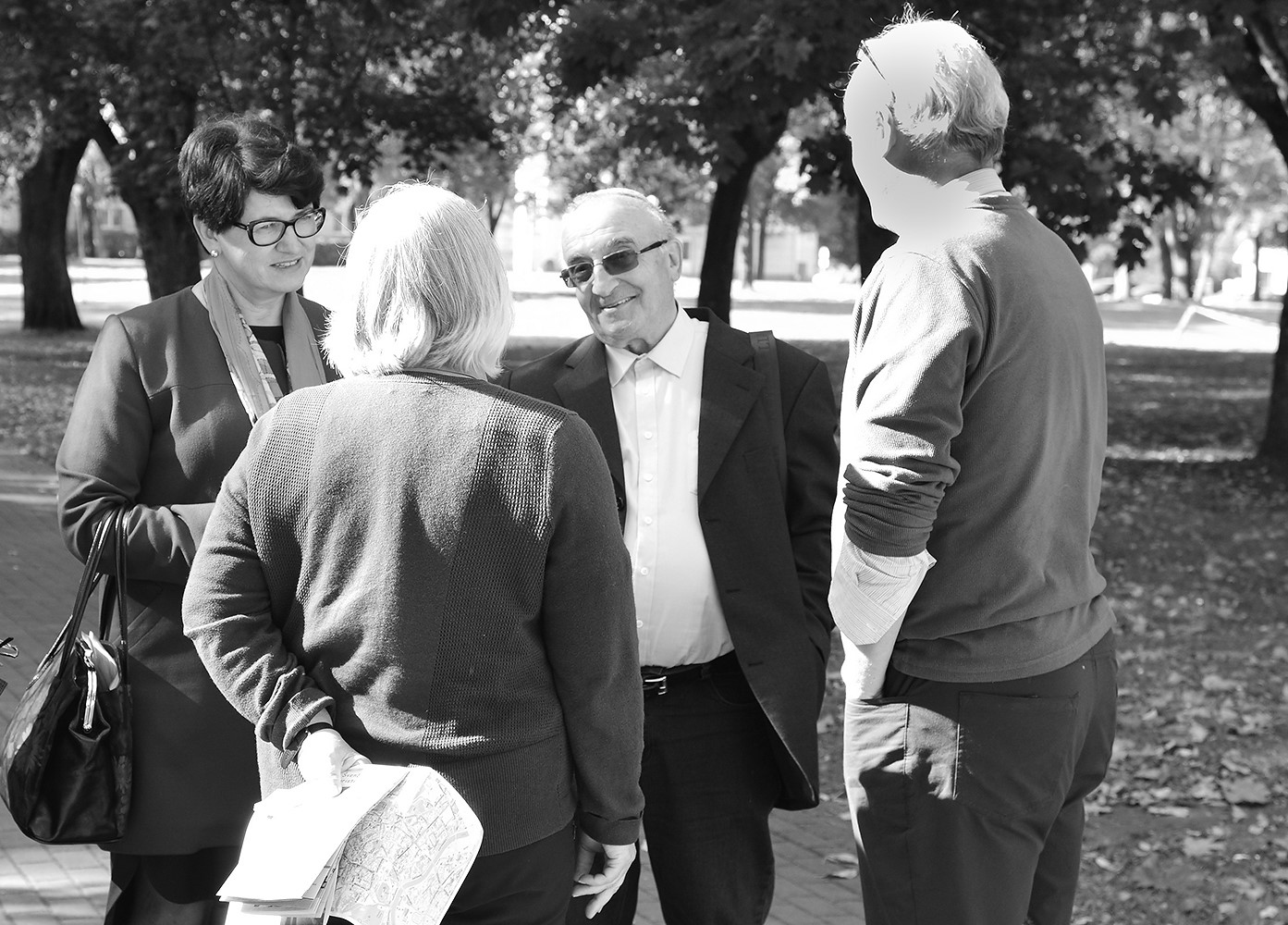
by Algis Jakštas
I first wrote several years ago about a man with an exceptional story, a man with two names and two surnames, Romuald Jabuk Weksler-Waszkinel, who was born in Švenčionys during the war and by some miracle became the only survivor from among all his family and relatives who once lived there. That miracle was the work of Piotr and Emilia Waszkinel. Jakub and Batia Veksler handed their son born February 28, 1943, over into their care and Piotr and Emilia had him baptized as a Christian.

Romuald Jakub Weksler-Waszkinel now lives in Israel and has come to Lithuania at the invitation of the Polish Institute in Vilnius. He also found time to visit his native Švenčionys. He visited the Menorah statue which recalls the former ghetto gate and other sites. As I said, none of his relatives who lived in Švenčionys survived. Some were killed in the forest near Švenčionėliai, others at concentration camps. His parents died at a concentration camp.
Barbara Orszewska, project coordination for the Polish Institute in Vilnius, accompanied Weksler to Švenčionys and was happy to translate for him. Švenčionys Jewish Community chairman Moisej Šapiro also accompanied him. I spoke with him by the Menorah monument there. My first question, or more precisely request, was for him to talk about his life, worthy of a movie or book.

“My story is, that until I was 35 I didn’t know I was Jewish. I was always unsure about ethnicity when I tried to compare my features and appearance with those around me. I didn’t look like a Pole, and Poles lived around, or like my Polish parents. When I turned 35 my mother told me I had other parents, Jews, who were murdered during the war. She didn’t know my original name. For 14 years I sought my true roots until I found my Jewish surname, Weksler. Now I have two first names and two surnames. And this is my greatest treasure. The Jews Jakub and Batia Weksler gave me life, and without the Poles Piotr and Emilia I wouldn’t have survived. In 2009 I went to live in Israel. There I found relatives of my mother and father, there I felt as if I had come home. I am very grateful to people and God.”
What feelings overtook you when you discovered you were Jewish instead of Polish?
I get this question often. As I said, in childhood and later I felt something wasn’t right when I looked at the people around me and my parents. In Poland I didn’t look like a Pole, and only after I went to live in Israel did I see that I do look Jewish. Of course it wasn’t easy to experience that disruption, but coming home is a great joy and a I am very grateful, because no one survived from my family and only good people and God preserved me. Not only did I have real parents, but an older brother born in 1940, and I, according to the records, was born in 1943. In my mind I think of him as my younger brother. When I remember my family, I always want to cry.
How old were you when the Waszkinels began to raise you?
I don’t know, and no one knows my true birthday. On the Lithuanian birth certificate issued here in Švenčionys I am Romualdas Vaškinelis, born February 28, 1943. When I started going to school, the teacher introduced me by reading: Romualdas Vaškinelis, born March 25, 1943. When I protested and shouted no, the teacher told me to ask my father when I was born. When I came home I told him: “They don’t when I was born at school.” “Nobody knows for sure when you were born,” my father said, and to me as a child that seemed very strange. I kept thinking, how could a father not know when his child was born?
Why did you choose the priesthood?
That’s a difficult question. I myself don’t now the exact answer. When I was little and went to church my parents, I liked the part where the priest collects money, that was my greatest religious experience, when you give a little money to the priest and he pats your head. I even played this game at home, I put things into a box and pat my own head. I learned how to play accordion as well, and once when the priest asked me what I was thinking of doing after finishing school, I said I would be a priest. I said it and my own words frightened me. (Romuald Jakub Weksler-Waszkinel completed seminary in Olsztyn and was consecrated a priest April 19, 1966. He continued his education thereafter, studying philosophy at the University of Lublin from 1968 to 1971. He specialized in Judaeo-Christian relations and French philosophy).
How did you reconcile the Catholic and Judaic faiths within yourself?
Well, Jesus was a Jew, not Japanese.
What did it feel like to visit places where your forefathers lived?
What do I feel? I cannot speak about this without emotion. From what I know, my father came from Sharkovshchyzna, which is now Belarus. My grandfather was a smith and my father a tailor. My parents seem to have lived in Vaiškūnai. The Waszkinels moved to Švenčionys in 1943 and lived at Vilniaus street no. 5. The earth is God’s house. And I grew up in this land, and I don’t have any claims on this place, because this is God’s land, and let the people living here be happy, let them live in peace and quiet, and I will come to visit. I will stand, breath the air and be happy.


